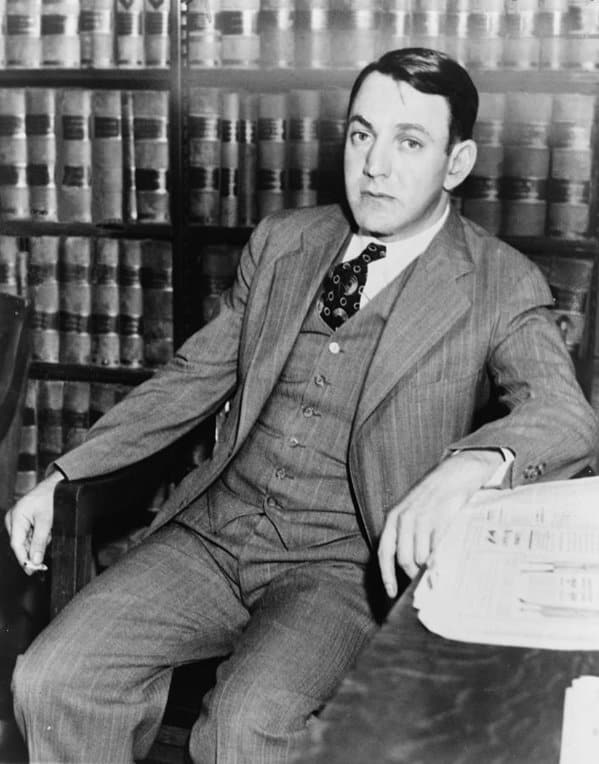
One of the untold stories in Yonkers is the tale of legendary mobster Dutch Schultz and his connection to Yonkers. Schultz, who was known as “the beer baron” of New York City during the days of prohibition in the 1920s and 30s, somehow was able to brew his beer in Yonkers and run the beverage through a tube that his men had built under the streets of the city.
Dutch had some help in his beer brewing and transport through the sewer lines of Yonkers, and most of the fingers point to one man – Tom Brogan. Brogan was another legendary figure in Yonkers politics for 50 years, who controlled the city through democratic politics that he dominated, much like Boss Tweed dominated democratic politics and government in Tammany Hall in NYC.
Several years ago, we ran a story from former Yonkers City Court Judge Richard Sweeney about Dutch and the beer that flowed under the streets of Yonkers. Here it is again, with some new thoughts at the end.
The Verdict Is In
By the Hon. Richard F. Sweeney
Edward Underhill opened the Yonkers Brewery in 1858 on Chicken Island. Underhill was also involved in ownership of a sugar refining mill on the Hudson River at about that time. Chicken Island was formed by the Nepperhan River and was later paved over to become a municipal parking lot. It was so named because a farmer, Henry Dingee, had lived there and raised – you guessed it – chickens.
Prohibition of sale, manufacture and transportation of alcoholic beverages was in effect in the U.S. from 1920 to 1933. By that time, Arthur Flegenheimer, also known as Dutch Schultz, had taken control of the Yonkers Brewery and used it for bootlegging.
During Prohibition, the brewery had a license to produce “near beer” and ice cream. While near beer came out of the factory by day, the real beer came out by night. On Sept. 29, 1930, city workers discovered a series of hoses throughout the sewer system that carried beer from the Yonkers Brewery.
Exactly how this delivery system worked was not determined, but it appeared that at night, Schultz’ gang members dressed as repairmen and laid the hose that carried the beer. At distribution points, the beer was barreled and delivered to speakeasies. In 1934, after Prohibition was repealed, the New York State Alcoholic Beverage Control Law went into effect, which required a permit to sell alcoholic beverages.
Schultz thought the State Liquor Authority would not give a permit to the Yonkers Brewery to make and sell beer if he was an owner and operator, so he used a person named Vogel as a front to give cash of about $100,000 and a mortgage in the amount of $280,000 to the brewery. Both the loans and mortgage were given to the Yonkers Brewery in Vogel’s name. Schultz, through Vogel, was given stock in the Yonkers Brewery in exchange for the cash loans.
Schultz was killed in 1935 by Murder, Inc., which was an enforcement arm of the syndicate, which had him killed because they were afraid that Schultz was going to have prosecutor Thomas Dewey killed. The members of Murder, Inc., were afraid that if Schultz killed Dewey, it would bring too much law enforcement down on them. Additionally, the other crime bosses wanted to take over Schultz’ operations. Schultz died Oct. 24, 1935 after being shot in a restaurant in Newark, N.J. Bernard Rosencrantz, Abe Landau and Otto Berman, three of Schultz’s close associates, were also killed.
Shortly before his death, Schultz put millions of dollars in cash and bonds into a box, and he and his bodyguard, Rosencrantz, buried it somewhere in upstate New York. It has never been found.
Thomas Brogan purchased the Yonkers Brewery in 1936. In 1938, the brewery declared bankruptcy. Frances Flegenheimer, Schultz’ widow, sued Brogan to recover the value of cash loans, stock and a mortgage made to the prior owners of the Yonkers Brewery.
Although Brogan claimed he did not know of the transactions for loans, stock and mortgage, he did not deny that they were given to his predecessor. Brogan asserted that the court should not hold him responsible for the loans, stock and mortgage because it was done in violation of the law, in that it intentionally avoided the New York State Alcoholic Beverage Control Law by having ownership or control through a fake or dummy. Because this is against public policy, Brogan asserted that the court should not hold him responsible. (End of article by Sweeney, who, this fall is again running for City Court judge in Yonkers.)
Dutch Schultz also lived in Yonkers, on the Bronxville-Tuckahoe border, with his wife, Frances, although many a night Dutch was out “working” and didn’t come home. We hope to report on Dutch’s Yonkers home in another issue.
Another twist to the Dutch Schultz story comes from former FBI Director James Comey, who grew up in Yonkers and whose family members served in the Yonkers Police Department. Comey, in an interview last year with Irish Times, said that his family told a story about his grandfather William Comey rose to Yonkers police commissioner and his battle with bootleggers funneling contraband beer in fire hoses between Yonkers and the Bronx.
“Even though my grandfather liked beer, he ordered his men to cut the fire hoses with axes and let the beer run into the sewers” – a move that prompted death threats and an armed guard on the family home, said Comey. The moral of the story is, the rule of law and integrity matter more than friendship, your love of beer or anything else. “My grandfather is as an early hero of mine because of a commitment to higher values,” said Comey.
This is a story that needs to be told, and written in its entirety. Anyone with information about Dutch, or Brogan, or the Comeys of the Yonkers Police Department, may contact me at dmurphy@ risingmediagroup.com. And if you want to raise a glass and have a beer in Dutch’s name this summer in Yonkers, what better place to do so then Yonkers Brewing Co.





